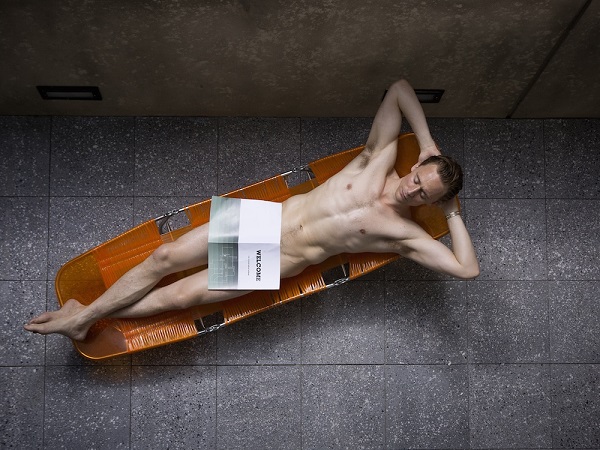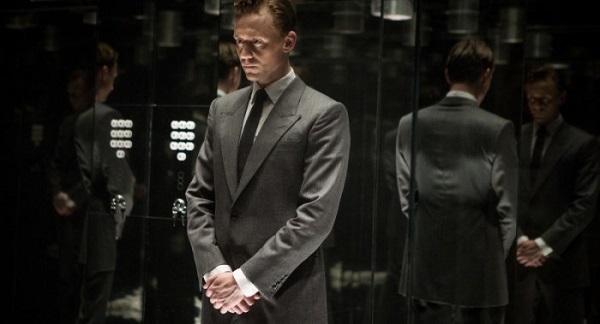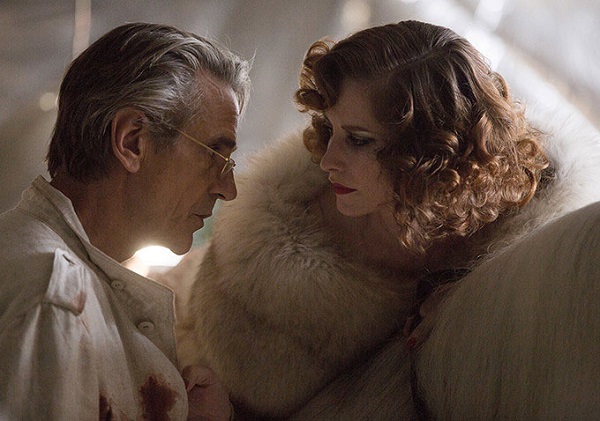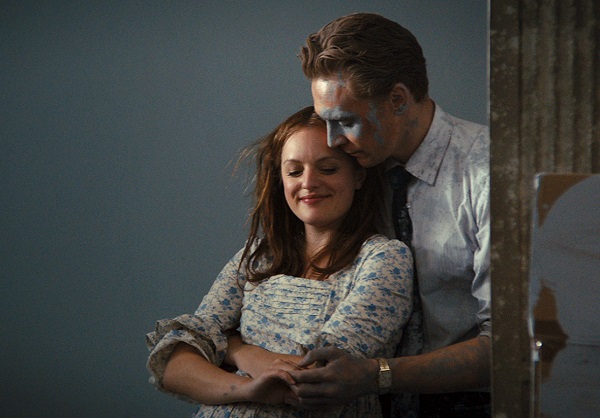High-Rise Review
"An ambitious art-house dystopia"
From
1984 to
Brave New World to
Children of Men the dystopia sub-genre of sci-fi is something that British authors and filmmakers have excelled at. Acclaimed writer J.G. Ballard also had a go with his 1975 novel
High-Rise and after 40 years, a cinematic adaptation has finally been made.
Robert Laing (Tom Hiddleston) is a psychiatrist who moves to a new high-rise building on the outskirts of a city. He soon finds out that the high-rise is a literal social hierarchy, where the super-rich and upper classes look down on the middle and lower-middle classes who live on the lower floors. When the power starts to fail, the classes fall into conflict being lead by Anthony Royal (Jeremy Irons), the owner and designer of the building and Richard Wilder (Luke Evans), the rebel documentary-maker.
 High-Rise
High-Rise was a passion project for producer Jeremy Thomas who brought the film rights back in 1975 and art-house directors like Nicolas Roeg (
The Man Who Fell to Earth) and Vincenzo Natalli (
Cypher) were linked to direct before Ben Wheatley and his wife/writing partner Amy Jump took on the challenge. Wheatley is a director with a unique style, mixing dark comedy and surreal, psychedelic imagery, which has lead to him being a divisive filmmaker where people either love or hate his body of work. Just compare the high Rotten Tomatoes scores his movies have received to the more mixed scores on IMDB.
High-Rise is a slightly more mainstream offering from Wheatley - it has a big name cast and is Wheatley's first adaptation. But the key word is slightly -
High-Rise is very much a Wheatley movie, his hallmarks are all over the movie. It starts with a cold opening, showing the high-rise fallen into death and anarchy and Mr. Hiddleston gets to munch on a dog drumstick.
High-Rise continues with a sly wit throughout and the surreal approach when we enter the upper floors and see the decadence the elite live in.

Wheatley and Jump decided to keep
High-Rise set in the 70s, making the movie a retro-dystopia, like
Never Let Me Go. It was clear that Wheatley was influenced by Stanley Kubrick's
A Clockwork Orange, showing a society that is tearing itself apart, using ugly brutalist buildings as a setting, being set in a similar version of a futuristic 1970s Britain, having a surrealist edge and using both classical and synthesized music for the score (there is a great cover of Abba's 'SOS' by Portishead in the soundtrack).
A Clockwork Orange is a great model to follow, being one of the best of movies in the dystopia genre. But
High-Rise drags its feet and is more aimless despite being about 15 minutes shorter than the Kubrick movie.
High-Rise is made up of montages and continuous partying sequences as the classes try to outdo each other. There is only so much drinking, drug taking and pure hedonism that anyone can take.
High-Rise has been seen as a satire of Thatcherism, but a more modern comparison would be with the ideology of the Tea Party where candidates advocated for the state to roll back what it provides to a minimum of services, leading to a break down in social order. Essentially, this what happens if a gated community tries to separate itself from the rest of the world. Gamers may see parallels with
Bioshock, a game that deconstructed Ayn Rand's ideas of Objectivism and her ideals in
Atlas Shrugged where the intellectuals, inventors, business-owners and creatives break away from the rest of the world and form their own secret city. But it was a city that collapses in on itself and becomes nothing but a chaotic disaster of a project. The same happens in
High-Rise.
 High-Rise
High-Rise also acts as a criticism of Brutalism architecture. Brutalism was a movement that dominated from the 1950s to the 1970s. The idea behind it was noble, to make modern cheap housing but often these high-rises often become estates of deprivation.
High-Rise took the idea of Brutalism being used for accommodation for affluent people but still having the same effects of producing squalor.
High-Rise has a great cast with Hiddleston's stock as an actor continuing to rise. As well as playing Loki in the Marvel Cinematic Universe, he recently lead
Crimson Peak with Mia Waskowska and Jessica Chastain and the BBC mini-series
The Night Manager. As Laing, Hiddleston gave an excellent performance as a refined doctor who has an underlying darkness to him, giving him a very sinister edge. He had outbursts of anger and some of the greatest moments where he made an unguarded comment, revealing more crude personality. It is type of a role that Hiddleston has come to master.

Hiddleston is also surrounded by the likes of Sienna Miller who works her way through the men of the building, Luke Evans, Jeremy Irons and Elisabeth Moss doing a convincing English accent. When Evans is first introduced he is shown to be a womanizer, a party animal and a creep, yet he becomes the man who channels the revolutionary fever. While Irons' Royal is made to be an articulate, intelligent man whose underlings are the ones who go astray. Though Evans' Wilder is far from an angel, he does have valid points about the inequality within the building and Royal later accepts his leading role within his faction.
Though
High-Rise does have a slightly surrealist approach, there are still logic problems that trouble the movie. The first question is where are the authorities as the building falls into chaos? The second is why do people choose to stay when it becomes a hellhole? The outside world is barely seen, but the people still go out to work so it is clear society is still functioning, so why do all but the most stubborn people choose stay? People die during the course of the movie and the police only visit once in a brief instance. If the high-rise was its own self-sufficient society with its own schools, law-enforcement, etc. then it would be understandable that the outside world had little effect on the community - but this theme was never approached.
High-Rise is a Ben Wheatley film for better and for worse. Wheatley's fans will delight in the wit and violence that they come to expect and Hiddleston is fantastic in the lead role. It is an ambitious movie and great at showing the anarchy that befalls the high-rise . But it's a movie for a niche audience and it will not be going to join the pantheon of great dystopias.
Pros
- Tom Hiddleston's performance
- Visually unique
- Themes of class-war and anarchy
Cons
- Overlong
- Slightly unfocused
- A Clockwork Orange and Bioshock have tackled these themes better
 High-Rise was a passion project for producer Jeremy Thomas who brought the film rights back in 1975 and art-house directors like Nicolas Roeg (The Man Who Fell to Earth) and Vincenzo Natalli (Cypher) were linked to direct before Ben Wheatley and his wife/writing partner Amy Jump took on the challenge. Wheatley is a director with a unique style, mixing dark comedy and surreal, psychedelic imagery, which has lead to him being a divisive filmmaker where people either love or hate his body of work. Just compare the high Rotten Tomatoes scores his movies have received to the more mixed scores on IMDB.
High-Rise is a slightly more mainstream offering from Wheatley - it has a big name cast and is Wheatley's first adaptation. But the key word is slightly - High-Rise is very much a Wheatley movie, his hallmarks are all over the movie. It starts with a cold opening, showing the high-rise fallen into death and anarchy and Mr. Hiddleston gets to munch on a dog drumstick. High-Rise continues with a sly wit throughout and the surreal approach when we enter the upper floors and see the decadence the elite live in.
High-Rise was a passion project for producer Jeremy Thomas who brought the film rights back in 1975 and art-house directors like Nicolas Roeg (The Man Who Fell to Earth) and Vincenzo Natalli (Cypher) were linked to direct before Ben Wheatley and his wife/writing partner Amy Jump took on the challenge. Wheatley is a director with a unique style, mixing dark comedy and surreal, psychedelic imagery, which has lead to him being a divisive filmmaker where people either love or hate his body of work. Just compare the high Rotten Tomatoes scores his movies have received to the more mixed scores on IMDB.
High-Rise is a slightly more mainstream offering from Wheatley - it has a big name cast and is Wheatley's first adaptation. But the key word is slightly - High-Rise is very much a Wheatley movie, his hallmarks are all over the movie. It starts with a cold opening, showing the high-rise fallen into death and anarchy and Mr. Hiddleston gets to munch on a dog drumstick. High-Rise continues with a sly wit throughout and the surreal approach when we enter the upper floors and see the decadence the elite live in.
 Wheatley and Jump decided to keep High-Rise set in the 70s, making the movie a retro-dystopia, like Never Let Me Go. It was clear that Wheatley was influenced by Stanley Kubrick's A Clockwork Orange, showing a society that is tearing itself apart, using ugly brutalist buildings as a setting, being set in a similar version of a futuristic 1970s Britain, having a surrealist edge and using both classical and synthesized music for the score (there is a great cover of Abba's 'SOS' by Portishead in the soundtrack). A Clockwork Orange is a great model to follow, being one of the best of movies in the dystopia genre. But High-Rise drags its feet and is more aimless despite being about 15 minutes shorter than the Kubrick movie. High-Rise is made up of montages and continuous partying sequences as the classes try to outdo each other. There is only so much drinking, drug taking and pure hedonism that anyone can take.
High-Rise has been seen as a satire of Thatcherism, but a more modern comparison would be with the ideology of the Tea Party where candidates advocated for the state to roll back what it provides to a minimum of services, leading to a break down in social order. Essentially, this what happens if a gated community tries to separate itself from the rest of the world. Gamers may see parallels with Bioshock, a game that deconstructed Ayn Rand's ideas of Objectivism and her ideals in Atlas Shrugged where the intellectuals, inventors, business-owners and creatives break away from the rest of the world and form their own secret city. But it was a city that collapses in on itself and becomes nothing but a chaotic disaster of a project. The same happens in High-Rise.
Wheatley and Jump decided to keep High-Rise set in the 70s, making the movie a retro-dystopia, like Never Let Me Go. It was clear that Wheatley was influenced by Stanley Kubrick's A Clockwork Orange, showing a society that is tearing itself apart, using ugly brutalist buildings as a setting, being set in a similar version of a futuristic 1970s Britain, having a surrealist edge and using both classical and synthesized music for the score (there is a great cover of Abba's 'SOS' by Portishead in the soundtrack). A Clockwork Orange is a great model to follow, being one of the best of movies in the dystopia genre. But High-Rise drags its feet and is more aimless despite being about 15 minutes shorter than the Kubrick movie. High-Rise is made up of montages and continuous partying sequences as the classes try to outdo each other. There is only so much drinking, drug taking and pure hedonism that anyone can take.
High-Rise has been seen as a satire of Thatcherism, but a more modern comparison would be with the ideology of the Tea Party where candidates advocated for the state to roll back what it provides to a minimum of services, leading to a break down in social order. Essentially, this what happens if a gated community tries to separate itself from the rest of the world. Gamers may see parallels with Bioshock, a game that deconstructed Ayn Rand's ideas of Objectivism and her ideals in Atlas Shrugged where the intellectuals, inventors, business-owners and creatives break away from the rest of the world and form their own secret city. But it was a city that collapses in on itself and becomes nothing but a chaotic disaster of a project. The same happens in High-Rise.
 High-Rise also acts as a criticism of Brutalism architecture. Brutalism was a movement that dominated from the 1950s to the 1970s. The idea behind it was noble, to make modern cheap housing but often these high-rises often become estates of deprivation. High-Rise took the idea of Brutalism being used for accommodation for affluent people but still having the same effects of producing squalor.
High-Rise has a great cast with Hiddleston's stock as an actor continuing to rise. As well as playing Loki in the Marvel Cinematic Universe, he recently lead Crimson Peak with Mia Waskowska and Jessica Chastain and the BBC mini-series The Night Manager. As Laing, Hiddleston gave an excellent performance as a refined doctor who has an underlying darkness to him, giving him a very sinister edge. He had outbursts of anger and some of the greatest moments where he made an unguarded comment, revealing more crude personality. It is type of a role that Hiddleston has come to master.
High-Rise also acts as a criticism of Brutalism architecture. Brutalism was a movement that dominated from the 1950s to the 1970s. The idea behind it was noble, to make modern cheap housing but often these high-rises often become estates of deprivation. High-Rise took the idea of Brutalism being used for accommodation for affluent people but still having the same effects of producing squalor.
High-Rise has a great cast with Hiddleston's stock as an actor continuing to rise. As well as playing Loki in the Marvel Cinematic Universe, he recently lead Crimson Peak with Mia Waskowska and Jessica Chastain and the BBC mini-series The Night Manager. As Laing, Hiddleston gave an excellent performance as a refined doctor who has an underlying darkness to him, giving him a very sinister edge. He had outbursts of anger and some of the greatest moments where he made an unguarded comment, revealing more crude personality. It is type of a role that Hiddleston has come to master.
 Hiddleston is also surrounded by the likes of Sienna Miller who works her way through the men of the building, Luke Evans, Jeremy Irons and Elisabeth Moss doing a convincing English accent. When Evans is first introduced he is shown to be a womanizer, a party animal and a creep, yet he becomes the man who channels the revolutionary fever. While Irons' Royal is made to be an articulate, intelligent man whose underlings are the ones who go astray. Though Evans' Wilder is far from an angel, he does have valid points about the inequality within the building and Royal later accepts his leading role within his faction.
Though High-Rise does have a slightly surrealist approach, there are still logic problems that trouble the movie. The first question is where are the authorities as the building falls into chaos? The second is why do people choose to stay when it becomes a hellhole? The outside world is barely seen, but the people still go out to work so it is clear society is still functioning, so why do all but the most stubborn people choose stay? People die during the course of the movie and the police only visit once in a brief instance. If the high-rise was its own self-sufficient society with its own schools, law-enforcement, etc. then it would be understandable that the outside world had little effect on the community - but this theme was never approached.
High-Rise is a Ben Wheatley film for better and for worse. Wheatley's fans will delight in the wit and violence that they come to expect and Hiddleston is fantastic in the lead role. It is an ambitious movie and great at showing the anarchy that befalls the high-rise . But it's a movie for a niche audience and it will not be going to join the pantheon of great dystopias.
Hiddleston is also surrounded by the likes of Sienna Miller who works her way through the men of the building, Luke Evans, Jeremy Irons and Elisabeth Moss doing a convincing English accent. When Evans is first introduced he is shown to be a womanizer, a party animal and a creep, yet he becomes the man who channels the revolutionary fever. While Irons' Royal is made to be an articulate, intelligent man whose underlings are the ones who go astray. Though Evans' Wilder is far from an angel, he does have valid points about the inequality within the building and Royal later accepts his leading role within his faction.
Though High-Rise does have a slightly surrealist approach, there are still logic problems that trouble the movie. The first question is where are the authorities as the building falls into chaos? The second is why do people choose to stay when it becomes a hellhole? The outside world is barely seen, but the people still go out to work so it is clear society is still functioning, so why do all but the most stubborn people choose stay? People die during the course of the movie and the police only visit once in a brief instance. If the high-rise was its own self-sufficient society with its own schools, law-enforcement, etc. then it would be understandable that the outside world had little effect on the community - but this theme was never approached.
High-Rise is a Ben Wheatley film for better and for worse. Wheatley's fans will delight in the wit and violence that they come to expect and Hiddleston is fantastic in the lead role. It is an ambitious movie and great at showing the anarchy that befalls the high-rise . But it's a movie for a niche audience and it will not be going to join the pantheon of great dystopias.